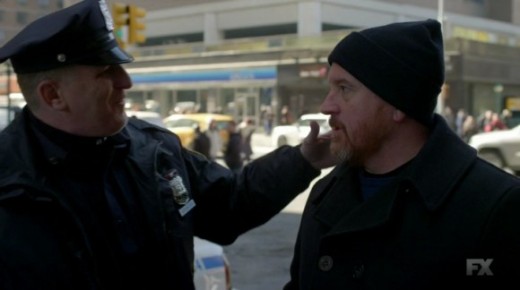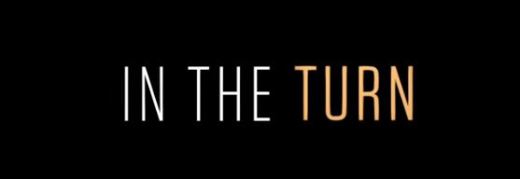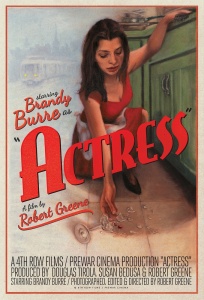Cop Story is a devastating episode in the continuing excellence of the quasi-comedic television show Louie on FX. Having watched the entirety of this program’s run, I have come to the conclusion that it is one of the most difficult, intelligent, surreal tv shows to be produced in recent broadcast history. Louis C.K. is a genius for presenting this tv show as a comedy, when it is only funny half of the time. For example, the beginning of Cop Story is a tense conversation between Louie and the young female shopkeeper of a kitchen supply store. Louie wants to buy an expensive cooper pot and is rebuffed repeatedly by the shopkeeper in his efforts to do so. She lays her logic down hard on why she won’t allow him to buy a professional-grade copper pot; suggesting that he should visit William-Sonoma if he wants to have his ego stroked, as he will never be a real chef like her younger clientele.The shopkeeper is brutal in her assessment of Louie and his unease around young people and even contends that everyone younger than him is smarter than he could ever hope to be. Their conversation is uncomfortable and a little too real. This is not a conversation that would transpire in real life. A shopkeeper might think a customer is a jerk, yet would not out-right say it to their face. The confrontational conversation is Louie’s projection of his hatred of himself. Due to C.K. implementing a slipping, surreal reality into the show’s structure, a conversation like this will occur to remind Louie of his own obsolescence.
The rest of the episode revolves around an awkward reunion with an old acquaintance of Louie’s. Louie runs into Lenny(Michael Rapaport) while walking past him on the street. Lenny summons Louie from a NYPD cop car and pretends to frisk him. It is obvious from the start that Lenny is overjoyed to see Louie, as he jokes around with him and demands his phone number so that they can hang out and catch up. Louie’s expression is of the thinly-veiled realization that he wishes he had walked down a different block and not run into Lenny. It is revealed that Lenny was Louie’s sister’s boyfriend long ago and though Lenny still wants to be friends with Louie, despite the breakup, Louie is reluctant. Regardless, Louie agrees to attend a Knicks game with Lenny, to basically fulfill his hanging-out requirement and then never see Lenny again.
When Lenny arrives at Louie’s apartment to take him to the basketball game, he brandishes his cop gun, using it as a toy. Louie is very unnerved by Lenny waving around his pistol, yet brushes off his childish, irresponsible behavior so they he can just get the night over with. As the pair walk to MSG to see the game, Lenny starts talking and never stops. He’s constantly talking about himself loudly, bringing up old memories which make Louie aggravated, and acts as a gigantic, pushy buffoon. Lenny is a veritable stream of talking; Louie hardly gets a word in edgewise and finally calls Lenny out about his embarrassing behavior and tries to go home early. Then Lenny’s world collapses; he realizes that he has lost his service pistol at some point during the evening and he completely implodes.
He frantically starts freaking out at Louie, raving that he cannot lose his gun. His life will be over, as losing a service pistol is one of the only ways that a cop can be fired. Without his gun, and the identity of a cop which it affords, Lenny is nothing and he is sickeningly aware of that. He knows that he is an annoying, brutish person; one who people actively avoid. Lenny doesn’t want to be a loser, so at least the profession of a cop can give him an identity; if his gun is lost, he will be too. The way in which Lenny rips apart Louie’s apartment to locate the gun and then starts screaming, crying and hitting himself, sobbing that his is stupid, is agonizing. If Lenny did have his pistol at that very moment of ultimate depression, he would have put it to his temple. Realizing this terrifying fact, Louie commands Lenny to stay put and he will fix things.
The conclusion of this episode shows Louie retracing his steps and miraculously finding the gun undisturbed on the sidewalk. A little comic relief is employed in this section, as Louie awkwardly tries to conceal the gun and even drops it in front of a crowd of cops who luckily do not notice it. When Louie returns to his apartment, he shows Lenny he has found the gun and that all is not lost. Lenny then tackles Louie into a hug and crushes him to the floor sobbing with relief. Louie cradles Lenny the broken man-child and strokes his back lightly with the gun still in his hand. This final image is highly affecting as the hug is an apology to Lenny; a way to make him feel there can be solace. The aptitude with which C.K. can cut to the bone of human frailty and also serve up a tender closure is the hallmark of this superior program. Louie is not laugh-out-loud funny, it is better than that. This episode is a fine illustration that surrealism employed in comedy can lay bare our most overwhelming feelings of failure and help us explore our hidden inner lives.


